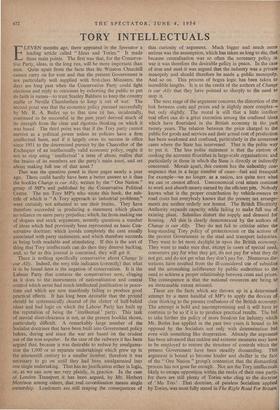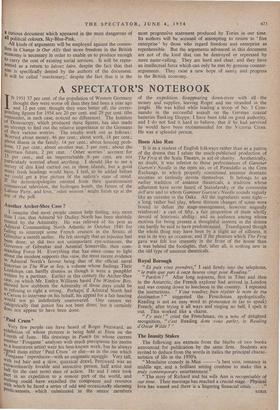TORY INTELLECTUALS
LEVEN months ago, there appeared in the Spectator a leading article called " Ideas and Tories." It made three main points. The first was that, for the Conserva- tive Party, ideas, in the long run, will be more important than men. Quite apart from the facts that Sir. Winston Churchill cannot carry on for ever and that the present Government- is not particularly well supplied with first-class Ministers, the days are long past when the Conservative Party could fight elections and reply to criticisms by exhorting the public to put its faith in names—to trust Stanley Baldwin to keep the country stable or Neville Chamberlain to keep it out of war. The second point was that the economic policy pursued successfully by Mr. R. A. Butler up to that time (it has, incidentally, continued to be successful in the past year) derived much of its strength from the clear and rigorous thinking, on which it was based. The third point was that if the Tory party cannot survive as a political power unless its policies have a firm intellectual basis, and if it largely owes its success in office since 1951 to the determined pursuit by the Chancellor of the Exchequer of an intellectually valid economic policy, ought it not to stop using ' intellectual' a term of abuse, realise that the brains of its members are the party's main asset, and set about making full use of that asset ?
That was the question posed in these pages nearly a year ago. There could hardly have been a better answer to it than the booklet Change is our Ally, written by the " One Nation " group of MP's and published by the Conservative Political Centre. The ten Tory MP's who wrote this book, the sub- title of which is " A Tory approach to industrial problems," were certainly not ashamed to use their brains.. They have therefore succeeded in producing a statement which places no reliance on mere party prejudice; which, far from making use of slogans and stock arguments, severely questions a number of ideas which had previously been represented as basic Con- servative doctrine; which avoids completely the cant usually associated with party statements, and which therefore succeeds in being both readable and stimulating. If this is the sort of thing that Tory intellectuals can do then they deserve backing, and, so far as this journal is concerned, they will get it.
There is nothing specifically conservative about Change is our Ally. Indeed, the very title indicates (correctly) that what is to be found here is the negation of conservatism. It is the Labour Party that contains the conservatives now, clinging as it does to the instruments of nationalisation and central control which never had much intellectual justification in peace- time and which are now manifestly failing to produce good practical effects. It has long been desirable that the ground should be systematically cleared of the clutter of half-baked ideas and bad logic on which the Labour Party has built up the reputation of being the ' intellectual party. This task of mental slum-clearance is not, as the present booklet shows. particularly difficult. A remarkably large number of the Socialist doctrines that have been built into Government policy before, during and since the war are based on the crudest use of the non sequitur. In the case of the railways it has been argued that, because it was desirable to reduce by amalgama- tion the 1,000 or so separate undertakings which grew up in the nineteenth century to a smaller number, therefore it was necessary to go on until they had been amalgamated into one single undertaking. That has no justification either in logic, or, as we can now see very plainly, in practice. In the case of London Transkort it has been argued, by Mr. Herbert Morrison among others, that real co-ordination means single ownership. Londoners are still reaping the consequences of that curiosity of argument. Much bigger and much more serious was the assumption, which has taken so long to die, that because centralisation was so often the necessary policy in war it was therefore the desirable policy in peace. In the case of iron and steel it was argued that the industry was a private monopoly and should therefore be made a public monopoly. And so on. This process of bogus logic has been taken to incredible lengths. It is to the credit of the authors of Change is our Ally that they have pointed so sharply to the need to stop it.
The next stage of the argument concerns the distortion of the link between costs and prices and is slightly more complex--• but only slightly. The moral is still that a little intellec• tual effort can do a great execution among the confused ideas which have flourished in the British economy in the past twenty years. The relation between the price charged to the public for goods and services and their actual cost of production has been weakened and confused, particularly in the numerous cases where the State has intervened. That is the polite way to put it. The less polite statement is that the custom of cooking the accounts flourishes in large-scale organisations, and particularly in those in which the State is directly or indirectly concerned. Morals apatt, this custom has the unhealthy con- sequence that in a large number of cases—fuel and transport for example—we no longer, as a nation, are quite sure what we can or cannot afford. Uneconomical coal mines continue to work and absorb money earned by the efficient pits. Nobody knows what is the proper contribution by vehicle-owners to road costs but .everybody knows that the present tax arrange- ments are neither orderly nor honest. The British Electricity Authority expands capacity while failing to make full use of existing plant. Subsidies distort the supply and demand for housing. All this is clearly demonstrated by the authors of Change is our Ally. They do not fail to criticise either the long-standing Tory policy of protectionism or the actions of the present Government in the steel and transport industries. They want to let more daylight in upon the British economy. They want to make sure that, except in cases of special need, consumers pay for what they get, do not pay for what they do not get, and do not get what they don't pay for. Numerous dis- tortions have resulted from the ill-considered use of subsidies and the astonishing indifference by public authorities to the need to achieve a proper relationship between costs and prices. The consequence is that the national resources are being to an inexcusable extent misused.
These are the facts which are thrown up in a determined attempt by a mere handful of MP's to apply the devices of clear thinking to the present confusions of the British economy. The attempt is bold and uncompromising and it will have to continue to be so if it is to produce practical results. The bid to take further the policy of more freedom for industry which Mr. Butler has applied in the past two years is bound to be opposed by the Socialists not only with determination but even with something like desperation. Already the argument has been advanced that sudden and extreme measures may have to be employed to restore the structure of controls which the present Government have been steadily dismantling. This argument is bound to become louder and shriller in the face of the " One Nation " group's contention that the dismantling -process has not gone far enough. Nor are the Tory intellectuals likely to escape opposition within the ranks of their own party, for there are still plenty of Tories who cling to the doctrine of ' Me Too.' That doctrine, of painless Socialism, applied by Tories, was most fully stated in The Right Road For Britain, tt curious document which appeared in the most dangerous of all political colours, Sky-Blue-Pink, All kinds of arguments will be employed against the conten- tion in Change is Our Ally that more freedom in the British economy is necessary in order to enable us to produce enough to carry the cost of existing social services. It will be repre- sented as a return to laissez faire, despite the fact that that sun is specifically denied by the authors of the document. It will be called reactionary,' despite the fact that it is the most progressive statement produced by Tories in our time. Its authors will be accused of attempting to return to free enterprise ' by those who regard freedom and enterprise as reprehensible. But the arguments advanced in this document are not of the kind that can be destroyed or repressed by mere name-calling. They are hard and clear, and they have an intellectual force which can only be met by genuine counter- arguments. They raise a new hope of sanity and progress in the British economy.



































 Previous page
Previous page